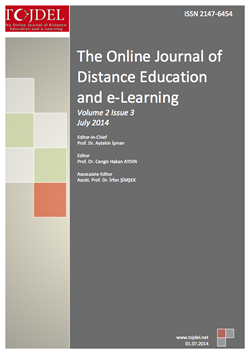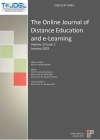TOJDEL - Volume 2 - Issue 3 - July 2014
 The Potential For Integrating a Distance-Learning Initiative Into the Curriculum of a Saudi Female Private College
The Potential For Integrating a Distance-Learning Initiative Into the Curriculum of a Saudi Female Private College Hanan M. Taleb
Abstract: Distance learning is a powerful source for providing education in developing countries. It tends to be an attractive option in countries where a rapidly-growing population is dispersed over a large geographical area. This is more or less the case in Saudi Arabia, which could benefit from maximising the use of existing physical and human resources whilst extending the geographical reach of education. This paper aims to investigate the potential for integrating a distance- learning initiative into the curriculum of Saudi female private colleges. The research used the survey and in-depth interviews as main source of gaining data. The paper revealed interesting findings such as time and travel constraints were at the top of the list of barriers for students. It has also emerged from the interviews that there were tentative plans to develop a distance learning curriculum in the future. There seems, however, concerns regarding the way distance learning qualifications are currently perceived by the Ministry of Higher Education in this country.
 The Use of Modern Mobile Platforms For Improving Quality of E-Learning Processes in Higher Education
The Use of Modern Mobile Platforms For Improving Quality of E-Learning Processes in Higher Education Nikola Slavkovic, Ana Savic
Abstract: During the past three years, the number of mobile broadband Internet users has surpassed the number of fixed broadband network subscribers. This change of global network access, shows that the mobile phone is one of the most frequent ways by which people are using broadband services. Mobile phones are used mostly by massive young population, which includes students. It is estimated that by 2016. mobile Internet use will significantly surpass fixed Internet. This change provides new features and benefits that are explored in this paper. New generation of mobile smart phones, based on various OS platforms, are very efficient education tools. In this paper we analized the students ability of using smart phones in learning process, through the case study, where students took part in e-learning proccess by implementing data in given or new smart phone applications, with the aim of improving overall quality of higher education.
 Performance Indicators to assess Distance Education Quality in Malta
Performance Indicators to assess Distance Education Quality in Malta Matthew Montebello
Abstract: The use of performance indicators (PIs) as quality assurance (QA) instruments within traditional campus-based higher education institutions has been the centre of much debate and research as educators and administrators questioned the effectiveness of such tools. Additional issues, doubts and research possibilities materialized when the same PIs were applied to assure distance and eLearning courses quality offered by traditional universities and other commercial higher education institutions. This paper analyses the issue of PIs in eLearning policy as quality assessment tools by briefly tracing the development of PIs within QA schemes, as well as, investigate the way they have evolved to form part of eLearning policy.
 Proposed Offering of Doctor in Communication Education Through Distance Learning
Proposed Offering of Doctor in Communication Education Through Distance Learning Richardson del Rosario Mojica
Abstract: Communication Education is a discipline recognized by the Commission on Higher Education (CHED) through its CHED Circular Memo (CMO) as a specified career of a Master of Communication graduate. The Polytechnic University of the Philippines Open University (PUP-OU) offers Master in Communication program to be more accessible to people. In PUP-OU, most of the students enrolled in the Master in Communication Program are in the field of communication education. In the Philippines, the University of the Philippines (UP) is the only university that offers a Doctorate degree in Communication: PhD Communication (UP-Diliman), PhD Development Communication (UP-Los BanĂŚĆ’os) and Doctor in Communication (UP-Los BanĂŚĆ’os OU). This study aims to propose the offering of Doctor in Communication Education through distance learning by determining the need for the program, its marketability and its feasibility and preparedness in terms of curriculum, faculty, administration and support services. Methods used in this study are both quantitative and qualitative where in data from communication educators were gathered through a survey and interview with the officials of PUP- OU was conducted. The results of the study showed that there is a need and there will be possible enrollees in the proposed program. The study concludes that Doctor in Communication Education can be offered through distance learning.


